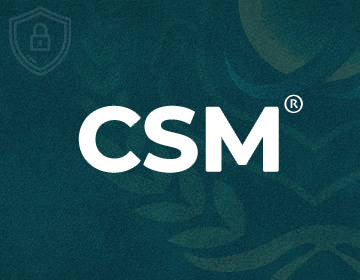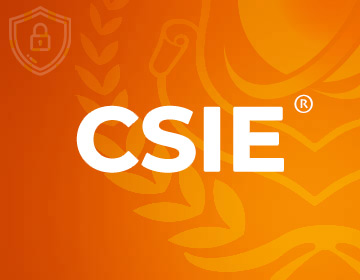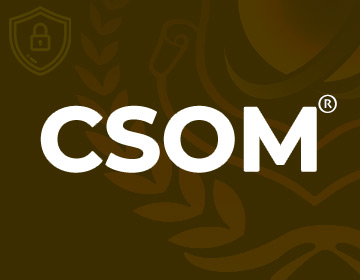Cyber Security Engineering Specialist®
Cyber Security Engineering Specialist®
3 Days, 1 Professional Certification
This course is well suited to professionals with varied disciplines and positions. Application and Business Security stakeholders, such as cybersecurity architects, engineers, designers, planners, operators and managers as well as professional roles such as project management, sales, finance and compliance, attend CSES®. This course provides a comprehensive understanding of cybersecurity architecture, cryptography and secure communications and the overall design as well a good understanding of web and mobile and the role of cybersecurity. How to leverage engineering in cybersecurity to address the risks associated with the application and data is adequately addressed. It covers the security consideration for the Application Ecosystem
Upcoming CSES® Events
Sorry no post found.
Course Description
This course is well suited to professionals with varied disciplines and positions. Application and Business Security stakeholders, such as cybersecurity architects, engineers, designers, planners, operators and managers as well as professional roles such as project management, sales, finance and compliance, attend CSES®. This course provides a comprehensive understanding of cybersecurity architecture, cryptography and secure communications and the overall design as well a good understanding of web and mobile and the role of cybersecurity. How to leverage engineering in cybersecurity to address the risks associated with the application and data is adequately addressed. It covers the security consideration for the Application Ecosystem
Who should take this course?
Cyber Security Professionals including but not limited to, Security Analyst, Security Engineer, Security Architect, Security Administrator, Security Software Developer, Cryptographer, Cryptanalyst, Security Consultant and also Application Developers, Finance Professionals, Data Center Designers/Engineers, Data Center Planners, Project Managers, Legal & Compliance Professionals, College Students & Graduates and Business Continuity Experts.
what you study
The course provides comprehensive coverage of the Cybersecurity Architecture History & Overview, Cybersecurity Architecture Governance, Reference Security Architecture, Cybersecurity Architecture Strategy, Cybersecurity Architecture Design Document, Cybersecurity Architecture & Operations, Cybersecurity Architecture Practical Designs, Intrusion Detection/Penetration System, Cybersecure Communications, Public Cryptography & Key Infrastructure Certificates, Secure Socket Layer (SSL) & Transport Layer Security (TLS) Protocols, cybersecurity considerations for the 7-layers of the Application Ecosystem, 5G network security, trends in cybersecurity architecture technology and the future of cybersecurity architecture.
Learning Outcomes
Learn how to design cyber security solutions, Learn cyber security best practices to keep the whole system cyber safe, e.g. Application Security, Learn to design and engineer robust cyber security architectures and approaches, e.g. defense in-depth, layered security, security-by-design, resilience-by-design and Learn cyber security principles beyond the CIA Triads.
Recommendations
It is recommended for this course to be taken back-to-back with CSIS® in a 5-day program. This will optimize learning and cost saving.
Course Features
Day 1
Introduction
Secure by Design Principles
Five Principles for Design of Cybersecurity Systems
Before Designing a system, the Context must be Established
Make it very Difficult for Attackers to Compromise your AE
The Design Must Make AE Downtime Very Difficult to Occur
Being Able to Detect Attacks
Reduce the Impact Should an Attack Occur
Application Security Architecture
The Application Ecosystem
Application Security
Application Architecture
TOGAF Security Architecture Phases
SABSA Secure Application Development
Application Security Architecture Governance
Application Architecture Security Checklist
Operating Systems & Virtualization
Overview
Attacker Model
Operating System Role and its Security Design Considerations
Symmetric Key Ciphers & Wireless LAN Security
Overview
Block Ciphers
The Feistel Function in a DES Operation
Triple DES (3DES)
AES Encryption and why it was Developed
128vs129vs256-Bit AES
Security Challenges with AES
Confidentiality Modes
Stream Cipher
WLAN Security Journey
Wi-Fi Protected Setup (WPS)
Day 2
Hash & Authentication
Overview
Hash Function Properties
Authentication
Hash Function Properties
Hash Function History
Issues with SHA2
Migration to SHA-3
Hash Message Authentication Code (HMAC)
Key Derivation Function (KDF) & Pseudorandom Function (PRF)
Authentication Based Password
Dictionary Attack
Malware Password Cracking Technique
Unix Encrypted Password System
UNIX/LINUX Password Hash
The MD-5 Based Scheme
SSHA Scheme
Automated Password Generator
Online Authentication
One-Time Password (OTP) & Token
SecurID Simple Authentication & Security (SASL)
HMAC-Based One-Time Password (HOTP)
Cryptographic Token Initialization
Data Encryption
Overview
The Need for Data Encryption
Case Study
Mathematical Introduction to Cryptography
Classical Cryptography
Euclidean Algorithm
Modular Arithmetic
Public Key Cryptographic Infrastructure and Certificates
Overview
The Need for Data Encryption
Case Study
Mathematical Introduction to Cryptography
Classical Cryptography
Euclidean Algorithm
Modular Arithmetic
Data Protection: Using Transport Layer Security
About TLS
Deploying TLS for Web Servers
TLS Secure Configuration Recommended
Protecting Mail Servers with TLS
Choosing Certificate Authority
CA Choice
Testing
TLS Recommended Cryptographic Profiles
Day 3
Transport Layer Security v1.3
TLS 1.2 vs TLS1.3 – How they differ
Removed Algorithms and Ciphers
Faster and Refined Handshake
AEAD Bulk Encryption
Simplified Ciphers Suites
Support
Upgrade
Troubleshooting Common Errors
Running Old Versions
Virtual Private Networks for Network Layer Security
Network Security Overview
Internet Protocol Security (IPSec)
IPSec Services
IPSec Modes
Security Association
The Encapsulating Security Protocol (ESP)
The Authentication Header
Anti-Replay Service
The internet Key Exchange (IKE)
Hardware Security
Hardware Design Process Brief Overview
Trust Root
Threat Model
Hardware Security Measurement
IoT Platforms Security Evaluation Standard
Secure Platform
Secure Element and Smartcard
Trusted Platform Module



















